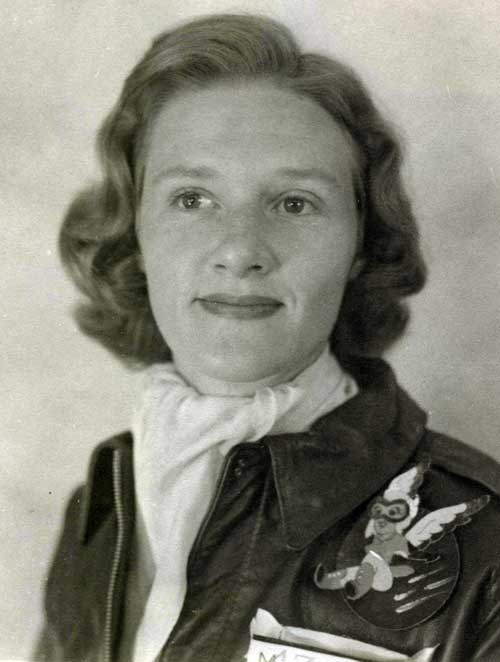| |
Jocelyn Moore Evernham, 91 pilot
during WWII
By Dwight
Daniels
UNION-TRIBUNE STAFF WRITER
August 1, 2003
Jocelyn Moore Evernham was already taking flying
lessons when a wartime newspaper advertisement caught her eye. In 1942, after having been a Red Cross nurse's aide at Mercy
Hospital in San Diego, she moved to Fort Worth, Texas. The United
States was embroiled in World War II, and the Army was looking for a
few good women to fly airplanes. The idea hadn't been tried before,
but male pilots were scarce. Most had already joined the war effort.
Mrs. Evernham immediately signed up, one of more than 25,000
women who applied for the experimental program. A few months later,
she became one of 1,830 who were accepted (though 1,074 eventually
received wings). Mrs. Evernham's orders were to join a 1943 class at
Avenger Field in Sweetwater, Texas.
After six months of intensive pilot training, Mrs. Evernham
earned her Women Airforce Service Pilots wings and reported to
Gardner Field in Taft, Calif. Mrs. Evernham, of Rancho Bernardo, who proudly ferried planes
throughout the country, transported military personnel and conducted
test flights, died from complications of cancer last week in Rancho
Bernardo. She was 91. Among the aircraft she flew were the PT-19,
BT-13, AT-6 and UC-78 – logging about 200 flight hours.
The job could be dangerous. On one flight to Twentynine Palms, she landed a small Ryan
trainer for the first time, coming in a little too fast, she said in
a 1987 San Diego Union interview.
"I didn't realize how speedy it was," she said. "I landed so fast
and taxied so fast that I saw I was about to run into another plane
landing ahead of me. A plane with an open canopy. I swerved." The
plane came so close to the other aircraft that its right wing
brushed the hair of the male pilot sitting inside. "A couple of
inches lower and the wing would have cut off his head," she said. Evernham got a stern rebuke from base brass, but she wasn't
grounded.
Soon, she was off to an airfield in Yuma, Ariz., to report
for training in the B-26C. Eventually, she towed targets in the
B-26C for a gunnery school, and completed 66 hours of time in the
airplane. Female pilots made do with what they had, sometimes wearing men's
flight suits too large for them. "We'd wrap them around and use
safety pins," she said. "We proved that women are very good pilots.
They could do anything the men could do." On Dec. 20, 1944, when the WASPs were deactivated, Mrs. Evernham
returned to El Cajon and gave up flying. She worked for the San
Diego Unified School District until she met Clark C. Evernham. They
married in 1948.
Mrs. Evernham was born in Pittsford, N.Y., in 1912,
and lived in the state until she was 14. Her family moved to
Baltimore, where she graduated from Girl's Latin High School in
1929. She held a museum education job in Buffalo, and later served
as director of education for the Boston Children's Museum. Mrs. Evernham had two children, Charles and Lorraine. Her
husband, Clark, was the director of the San Diego Museum of Man for
23 years. He died in 1971. Mrs. Evernham traveled extensively
throughout South America and Europe.
She worked for the San Diego
County Library system for four years, creating popular shadow puppet
shows for children. The WASPs, disbanded as the war wound down and male pilots began
returning to the states, received no real recognition. Finally, in
1997, Congress extended veterans' status and benefits to the women.
"Better late than never," Mrs. Evernham told the
Union-Tribune last year. She moved
to Julian in 1983 to live on a ranch. In 1987, she moved to Colorado
before returning to San Diego three years ago to live with her
daughter, who had become a pilot. The two went flying together
frequently. For her 90th birthday, Mrs. Evernham flew her
"dream ship," the AT-6 Texan, the advanced trainer she had piloted
during World War II.
Mrs. Evernham was an active member of aviation organizations and
made presentations about her flying experiences during World War II
at air shows, civic events and schools. Her life story is part of
the National Veterans' Oral History Project, which videotaped an
interview for the National Archives. Last year, she began writing a
book, tentatively titled "Finding My Wings," about her experiences
as a WASP. It is to be completed by her daughter. Private services will be held.
Mrs. Evernham is survived by her daughter, Lorraine of Rancho
Bernardo; son, Charles S. Evernham of Gunnison, Colo.; and one
grandson. |

